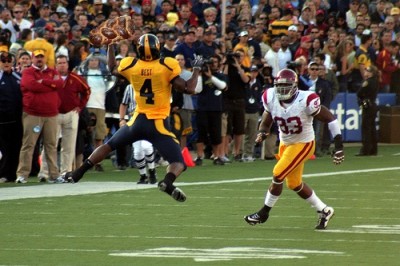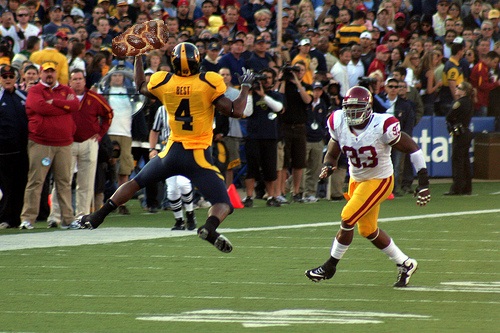
A cool breeze rolls through campus and students everywhere know what that means. It’s that time of year again. No, it’s not the High Holy Day season that comes to mind, but football season. For Jewish college students, it’s the start of another potentially conflicted semester. As Jews celebrate Shabbat each weekend, campuses around the country prepare for their biggest
event of the week, the football game. With football programs on over 1,000 NCAA campuses, football is everywhere. For practically the entire fall semester, many alumni, faculty and students look forward to the football game more than any other event.
Football is the most popular sport on campus, as seen in television ratings and attendance numbers. On September 7, TV by the Numbers reported that ESPN averaged 3.8 million viewers per hour of football programming. CBS Sports released a poll in January 2013 noting that college football is the third-most popular sport in the United States behind only the National
Football League and Major League Baseball, respectively.
But how are Jews to celebrate Shabbat and be a part of the campus football culture? It starts with understanding Shabbat tradition.
A closer look at those restrictions shows that Jews aren’t forbidden to partake in the Saturday football festivities. It just takes some planning.
Ashley Rosenberg, a student at the University of Arkansas Medical School, knows the importance of football on campus. She mentions that she never misses a Razorback football game and has friends that get creative with their scheduling conflicts.
“I have friends who are Jewish and keep Shabbat that have never been to an Arkansas football game because they always start before the Sabbath ends. It is a huge deal to go to football games down here so they usually record the games and watch them when Shabbat ends,” Ashley said.
You can buy tickets and arrange meetings with friends in advance, or walk to the game rather than travel by vehicle. Shabbat tradition and college football suddenly don’t seem so conflicted.
Rabbi Matt Rosenberg of the Texas A&M University Hillel experienced this conflict first hand.
After spending six years in rabbinical school, Rosenberg joined the A&M community just in time for the Aggies to face off against top-ranked Alabama—on Yom Kippur. “Texas A&M football is a huge part of the lives of my students and I am proud of their ability to be passionate about football as well as their Judaism and on a day like Yom Kippur, with the biggest game of the year, maintain their commitment to fast while attending the game in 95-degree heat,” Rosenberg said. “It’s a challenge to maintain such traditional practice, especially in a place such as College Station where there is a limited Shabbat community and no weekly egalitarian Shabbat morning service.”
Fortunately for his students, kickoff wasn’t until 2:30 p.m. leaving ample time for the morning services. As he was studying in rabbinical school, he learned to be flexible and creative within Jewish tradition and he utilized that to help his students uphold both Jewish and Aggie traditions.
College isn’t the only place where Jewish students run into unfortunate scheduling difficulties. Jewish high school students also run into some significant hurdles as they try to find a similar balance.
The issue took center stage in Colorado a few years ago. Rocky Mountain Hebrew Academy—now Denver Jewish Day School (JDS)—joined the Colorado High School Activities Association (CHSAA) in 2002 with the hopes of simply providing athletics to its small (less than 100 students) group of athletes. A few years later, the school not only filled its schedule but also excelled.
In 2008, both JDS’s boys’ and girls’ basketball teams qualified for the playoffs. However, the postseason in Colorado is usually played on Fridays and Saturdays. JDS was told that CHSAA would not reschedule Regional playoff games in order to accommodate Shabbat despite not allowing any practices or games on Sundays. After a few years of pressure from the community and lawmakers, CHSAA changed its policy to accommodate Jewish tradition. JDS continues to honor its commitment to its students and the community that it was so willing to fight for in 2008.
“At Jewish Day School, Judaism is first and everything else is second. Observing the Sabbath is more important than anything,” said Josh Lake, Athletic Director at Jewish Day School. “I think a lot of the kids accept it and appreciate it.
“What it shows is that we [can participate in athletics] at the highest levels and observe Shabbos and not have to compromise one for the other.” Judaism places utmost importance on creating communities. As young Jews build their campus identities, the ability to balance multiple communities should be a welcomed right of passage.
Rabbi Michelle Pearlman of Monmouth Reform Temple in Tinton, NJ notes that Judaism is a religion most fully lived in communities—whether it’s wearing your campus colors in the middle of the student section on Saturday afternoons or surrounded by fellow Jews at the local synagogue, to be Jewish is to take part in the community.
“My advice would be to find like-minded students and build a community of friends with the same goals so that you do not have to experience the beauty of Shabbat on your own,” Rabbi Rosenberg said.
This common ground between the traditions is the most important. Whether singing at services or screaming for a first down, Shabbat is all about community. In the heart of the season—be it football or Jewish holiday—both traditions can be on the same team.
Eric Steitz graduated from Hastings College in Nebraska.

